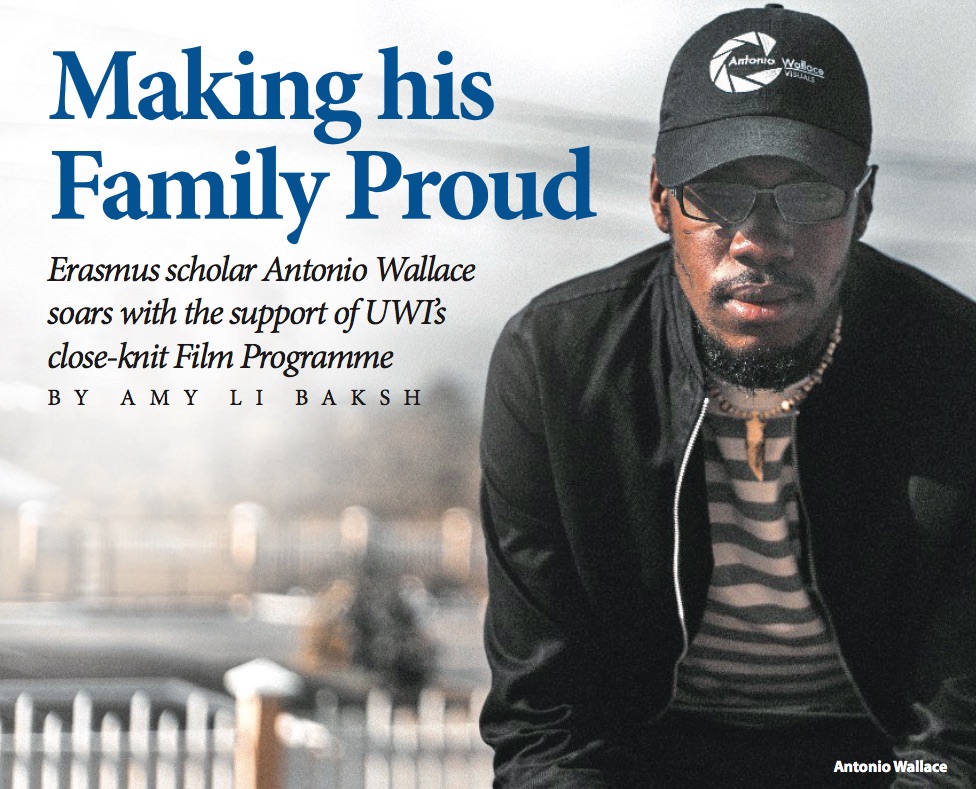
When Antonio Wallace picked up his first camera, just before entering his degree programme at The UWI, he didn't know that it would lead to him switching his focus from information technology to a BA in Film Production and Major Film Studies. And he certainly did not know he would be completing his final film project in the middle of a pandemic.
That didn't stop him or the team at the film programme from finding creative solutions to working in this crisis. Now, Antonio's passion for filmmaking is about to take him on another journey— studying documentary filmmaking in Europe, as part of the Erasmus Mundus Joint Master's Degree scholarship programme (EMJMD).
“To complete work during COVID-19 was the hardest thing to do,” says Antonio. As the team scrambled to adapt to the new normal, they had to change their script and find workarounds for editing the footage when they didn't have access to the film building. “There was real chaos trying to create a film during this time,” he says. But they made it work.
According to Yao Ramesar, head of The UWI St Augustine film degree programme, this type of adaptive creativity is part of life as a filmmaker: “Filmmaking is about transcending practical challenges all the time... It is problem solving. What we had to do was an additional challenge, and it is not going to be easy, but nothing is. So we worked out how to complete this film during the pandemic, observing all the protocols.”
The EMJMD programme is fiercely competitive, and thousands of students around the world apply for a space. Since 2005, almost 100 students from Trinidad and Tobago have been awarded the scholarship, a group which now includes Antonio. His work follows the trajectory of what Mr Ramesar has been trying to inculcate at the film programme— “We are taking very indigenous, local stories that have a universal theme.”
For Antonio, the local stories he gravitates towards focus on our rich creative culture. “I'm interested in creating documentaries surrounding Trinidad and Tobago and the Caribbean... I'm interested in global stories, but also local like."
With documentaries, he feels more able to get to the depth of truth, and to have important conversations about not just the mainstream aspects of our culture, but its origins and the parts of our history that build what we have today.
Storytelling is at the core of what they do at the Film programme, and part of this is acknowledging the responsibility that storytellers have to the rest of society. Antonio's work, and those of his fellow students, reflects this—tackling serious political and social issues like race, gender, and culture, and how they all factor into our postcolonial society.
His documentary, A Creative Story, talks about the art community and what it means to get into the arts. Part of his message is to follow your passion, even if it is in a field that might not be as well-supported in the Caribbean. “If you want to get into the arts, don't let anyone discourage you,” he says.
Out of all of the artistic fields, film is the most collaborative. The communal aspect of the art form has fostered a family structure within the Film programme, especially as classes tend to be on the smaller side.
“We were able to work in small groups, and everyone was close,” he says. “It was like a family— you felt like you were home. I would have no class and I would want to go to the building just to relax and do work because it was so welcoming. The fact that it is a family, not just a learning institute, it makes the difference.”
Because the industry requires so much collaboration to create a film, and because we have all grown up on the global mega-entertainment industries like Hollywood, getting into the art form can seem daunting. Overcoming that mental barrier is part of what Yao Ramesar and the programme hope to accomplish.
He says, “Part of what we try to do is demystify film... these things are more accessible than you think. You have to work very hard, and it has to be your life's work, but it is much more dependent on your input. Once you know what to do, you can reach anywhere with your story... So we don't just show how to make films, but how to get them there, distribute and get them to exhibit.”
Another part of this process is waiting. And this is where Antonio is now. With COVID-19 still very much an unfolding crisis, there is some uncertainty in the air. But if all goes well, he expects to be starting his new studies in early 2021, where he will have a chance to work with filmmakers in Portugal, Hungary and Belgium. In the meantime, he is continuing to find adaptive ways to make his art.
“I'm trying to create or film some documentaries while I'm home, and then I can edit afterwards,” he says.
It's been a strange and exciting journey so far, and it's hard to say what new challenges will arise as Antonio and the new generation of filmmakers work out how to practice their craft at a time like this. But as Mr Ramesar says— “You have to love film, and sometimes, love hurts.”